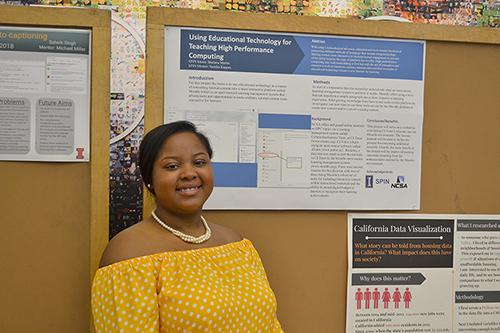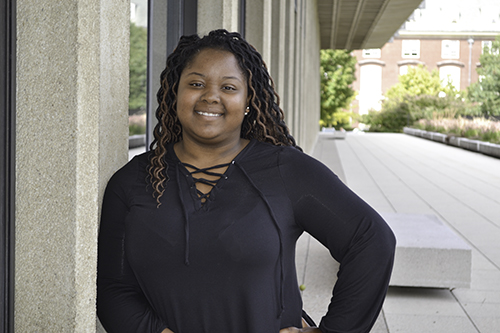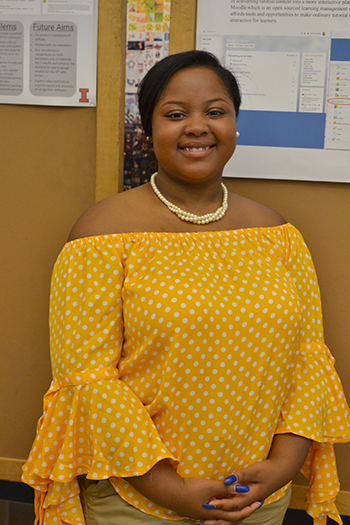SPIN Introduces Shelana Martin to Cybersecurity and the Open Source Platform, Moodle
September 4, 2018

Shelana Martin with her poster at the end-of-the summer Poster Session at NCSA.
How did Shelana Martin, who’s not a computer science major, end up in an NCSA internship? The rising senior in education technology under the College of Education’s Learning and Education Studies program was part of NCSA’s SPIN (Students Pushing Innovation) internship program. SPIN fosters interdisciplinary collaboration, encouraging Illinois undergraduate students, and not just computer science students, to do challenging research related to cutting-edge new technology. The new technology Martin learned was Moodle, an open-source learning management system. Plus she also learned quite a bit about cybersecurity too.
For Martin, who has a background in astronomy, a minor in informatics, and is majoring in education technology, the SPIN project retrofitting cybersecurity facts into an engaging educational technology format was a perfect fit. “The project kind of encompasses all three,” she says regarding its alignment to her various studies.
Begun in 2012, SPIN was designed to not only encourage undergraduates to tackle cutting-edge research mentored by world-class researchers on campus, but in doing so to provide access to new technologies such as high-performance computing, data analysis and visualization, or cybersecurity, and possibly NCSA’s Blue Waters supercomputer.

Shelana Martin outside the Education Builiding.
Regarding SPIN’s interdisciplinary emphasis, according to its director, Olena Kindratenko, NCSA's Education and Outreach Coordinator, most of the projects are interdisciplinary in nature, using computation to solve problems in non-technical areas.
However, Martin’s research this past summer was using technology to teach about technology; she was tasked with converting not-so-interesting content on cybersecurity into immersive and interactive content on a platform called Moodle. Martin explains why the content needs to be more exciting.
“Well, because it's important,” she acknowledges. The idea is that users wouldn’t just glance at the content, but “actually read the content, and engage with the content, and honestly become aware of any different type of habits they might have.” She says certain information could be useful when they're creating a password or trying to figure out if their browser is safe or not for them to use. “The content itself is really amazing!” she claims.
Thus, her goal this summer was to make the content more interactive using the Moodle learning management system, often used on campus by various courses. She describes several strategies she employed in an effort to encourage users to actually engage with the content. For one, they could click on a video and answer questions that are in the video. Or, instead of reading a paragraph, a user could drag and drop words to get immediate feedback “to see if where you put those words was correct or if the information was something you could take and apply to your daily life.” Her Moodle website also provided links to different sites for information about cybersecurity and how to secure one’s PC or laptop.

SPIN Intern, Shelana Martin.
Might someone who is concerned about cybersecurity (like me, the author of this article and a non-student) access this site in order to learn more about cybersecurity? As of right now, no. However, once the information is fully converted to the Moodle website, Martin hopes to have self-enrollment which would allow the general public to access the information to their own benefit.
Martin reports that one of the challenges she faced this summer was using Moodle itself. Even though she had used it previously for different classes at the university, she says there were a lot of functions she had never used before that she had to become familiar with.
“I had to kind of dive into all of the different tools and learn what each tool can do and possibly make that content more interactive, so it was a bit of a learning curve. But the good thing about Moodle is, it's very content and tutorial based.” She says the platform’s tutorials walk a beginner through each tool, giving examples about how each tool can be used.
Plus, she says that even though she’s from a technology background, she doesn’t have a lot of background knowledge on cybersecurity. She admits “maybe [it] could've helped if I’d known a little bit more,” in terms of converting the content to “make it more immersive and get the content through to the learner. But honestly, because I have a little bit of information because my minor is informatics, I'm able to kind of gauge if that content is being used properly and if it is more effective for me to use a certain tool or not to make it more interactive.”
So did she learn a whole lot more about cybersecurity this summer? “Yes, I did. I need to change some of my own passwords,” she confesses.

Shelana Martin with her poster at the end-of-the summer Poster Session at NCSA.
Martin indicates that the biggest thing she learned this summer was how to create content and how to make it more immersive on an open source learning management system. She says that a lot of times during her academic career, she’s been able to create lessons on other different platforms.
“But it was my first time working with Moodle and so learning how Moodle works, learning different tools, learning what type of things I can do moving forward to make content, even if not on Moodle, that was very interesting. And being able to kind of throw myself into something that is new to me, but isn't a new topic.” She also appreciated “being able to learn about cybersecurity myself, and also how to use that information to make it more interactive and immersive for a learner.”
Regarding what impact her experience this past summer has had on her skill set, she reports that it definitely gave her a little bit more expertise in these types of management systems, and being able to convert any type of tutorial content, and not just cybersecurity.
“I think it will give me a leg up on how to make certain content more interactive versus being a read-and-go type of content. So I think it's definitely a skill I've developed doing this project—being able to use this website and being able to take content and change it around.”
Martin’s career plans include grad school in education and design, still working in technology and education. “I kind of want to focus on educational policy,” she explains.
Author/Photographer: Elizabeth Innes, Communications Specialist, I-STEM Education Initiative
More: Blue Waters, NCSA, Student Spotlight, Summer Research, Undergrad, 2018
For additional I-STEM web articles about NCSA, see:













.jpg)
















